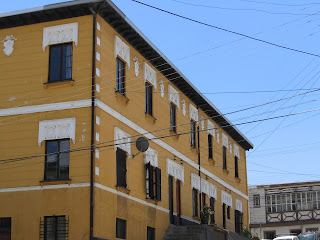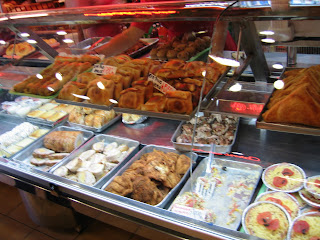if Chile had food to match its wine. Last night I samples from three
different bottles and the dry reds are excellent, up there with any
country if you like high alcohol bold reds. Brenden, a 44-year old
from Ireland arrived and was into his third week. He reminded me of my
grandfather with his enthusiasm and earnestness. He had dreamed his
life of seeing Machu Picchu and finally did. He had a keen interest in
naval history and told the story of Montevideo. A German warship had
sunk 9 British vessels. A British submarine had sheered off a rudder
and all the German ship could do was make circles. So she sailed to
Montevideo where she was cornered by three British warships. She asked
permission from the Uruguayans if she could stay. Three days, they
told her, and then the British can have a go at you. The whole world
watched and waited as it was the lead stories in the papers. On the
third day the German captain told his men to leave the ship. The
captain then let the ship out to sail and abandoned himself. Before
the British could fire the ship blew to pieces. The German captain had
loaded the ship with incendiaries. No one won, and it is for this
reason the Uruguayans celebrate this nonvictory each year.
Brenden hadn't drunk for three weeks yet I offered him good wine and
we ate dinner nearby. He spoke passionately and animatedly the whole
night. A good man.
I drank with Brenden and Marcos, a German, and a Mexican girl who
lived in Santiago, late until the night.
I awoke and knew I had to train. I set off in my running shoes and
ascended and descended the steep hills of Vina del Mar and gazed at
the European architecture and wealth of the city and blue bays and
red, green, and blue painted walls and edifices. I found a green park
and did knee raises, dips, and pullups. I sat in the sun and thought
about my voyage. There was no quitting, no voyage to give up. I had
nothing in America. If I had nothing in South American then I amounted
to nothing. If I amounted to nothing, then I would be miserable, plain
and simple. So really there was nothing to worry about.
At the end of my run I happened upon a slew of beautiful mansions
overlooking the city. I thought of the oligarchs and their power. I
thought that they were controlled by the matrix that everyone believed
them to control. They needed the matrix to run to maintain their
homes. They needed state police for protection. They needed
electricity. Those on the margins don't care about the end of the
world. Here, from everyone I have spoken to, the end of the world is a
*cambio,* a change. For those who build their own homes and raise
their own animals and bake their bread with a wood fired oven and
hatch their own ducks and fish in their own man-made pond, the end of
the world will not matter. I did not envy the great mansions, although
I though of being inside for a moment. To be inside would mean to lose
my friendships. I do not want or need a castle and servants. Even
though Leo wanted to punch me, and even though Leo is a Communist (he
told me unequivocally, and said it was nearly illegal to be so in
Chile), I believe that what he says about the pueblo is true.
As I walked among the mansions there was an open gate and although I
had the feeling it was a private residence when I entered the back
yard I knew that it had to be a public space or a museum as two
cannons were perched on each side of a cliff overlooking the city and
the ocean. The flag of Chile waved atop a large post over what must
have been an old palace. As I turned around a man in a military
uniform stood in the balcony overlooking the city and drank a glass of
white wine. He looked at my quizzically. Perhaps they were having a
party in the museum, I thought. I man in a white suit rapidly
approached me. “Buenas tardes,” he said. I asked him if the building
was a private residence and was fully prepared to offer an apology. He
told me the building was a government building and mentioned something
about the police. Ah, the chief of police must live here. Ah, shame on
me for entering. He closed and locked the gate behind me and I
continued to walk among the mansions and take photos.
When I arrived back at the hostel I told Alejandro that I disturbed
the garden of he old palace where the chief of police lived. He asked
me to point to where I was. There, I said, at the top of the hill
overlooking the sea. The large palace with the flag of Chile. “You
walked into the President’s backyard?” “Which president,” I asked.
“The President of Chile. It is his vacation residence.” I excused
myself for my ignorance and asked Alejandro who, as it happens, was
the current president of Chile. I wanted to know his name in case I
had to apologize in person. Mr. President is always appropriate, but
perhaps over wine we would grow more familiar. “Sebastian Pinera,” he
told me. Later on I searched for a photo of President Pinera and he is
a fine looking gentleman and wears a sash across his chest.
After my trespass I found a small market with prepared food. You took
a number and you waited a long time and they miss you number but you
bring it to the counter and insist to be served. Then you order
stuffed duck and cheese and meat casserole and tortilla salad with
tuna and lettuce and tomato and they give you two receicpts and you go
to a central counter and pay and each recipt is stamped and then you
go to the bag preparation station where your food is wrapped and you
present your stamped receipts. It is mostly identical to the Chilean
border crossing.
This is the flag of Chile flown in at the President's summer residence. Those hiking around the city naturally gravitate to the flag. Unless you are government official, it is not encouraged that you visit the summer residence.
This is the back yard of the President's summer residence. It's the best view in town but I was, accidentally, trespassing.
The self-service food centers serve incredible Chilean dishes. Only the empenadas of Rio Turbio would come close to rivaling those of Viña del Mar.
This is egg-stuffed pork and is excellent.
A corn casserole.
Stuffed pork.
There are many hostels in Viña del Mar, and this is one of them.
Maps of Chile and Argentina. Both countries produce fine maps.
















































































